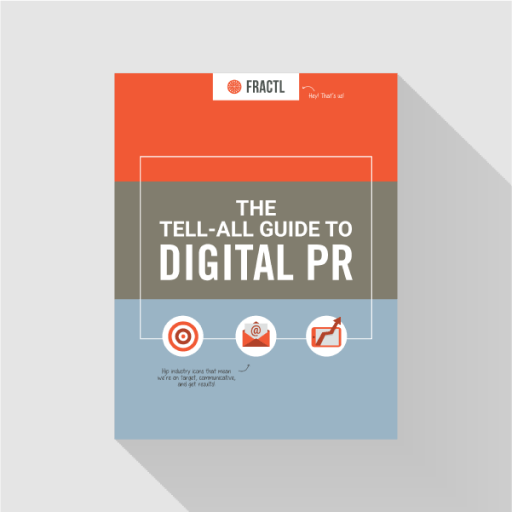It’s exciting to see your byline and headshot on top-tier websites or niche industry blogs. Sharing your expertise in a blog post on high-authority sites not only builds your own personal brand, but it can also bring exposure to your company as well. Sometimes that exposure will even come packaged in the form of a dofollow link, which is great for SEO.
Before you spend all your time and resources pumping out guest posts, read on to learn why that may not be the best link building strategy for your brand.
What is Guest Posting?
Guest posting is when you write a blog post or article on a website other than your own. It’s a common tactic that digital marketers use and can have a positive influence on brand awareness and SEO if done correctly.
Many authoritative blogs and websites will encourage experts to submit guest posts to supplement the content on their website. Usually, they’ll want some time of exclusive data, innovative content, or canonical article on a topic of your expertise that you alone can offer. Often times, they’ll include a link of your choice in your post or author bio, which, if it leads back to your website, will pass link juice and can improve your search rankings.
An example of a well-known publisher that has a vast contributor network is Forbes. The 100-year old publisher accepts guest post contributions from experts across all verticals, especially finance, business, tech, sales, and marketing. A single guest-post at a high-authority publisher like Forbes can elevate your brand and drive traffic to your site.
Is Guest Posting a Good and Safe Link Building Strategy?
So while every brand would like a backlink from a top-tier site like Forbes, should you invest all of your time and resources in a guest posting strategy? Unfortunately, it’s not so straightforward.
In 2017, Google issued a warning about using guest blogging to build links. Google goes on to cite some factors that will get you penalized by the search engine
-
- stuffing keyword-rich links to your site in your articles
- having the articles published across many different sites
- using or hiring ghostwriters that aren’t experts about the topic
- repurposing the same or similar content across multiple articles
All of the above are problems that can occur with companies executing large-scale guest posting strategies when their only goal is obtaining backlinks. So, while, yes, guest posting will generate backlinks, “when Google detects that a website is publishing articles that contain spammy links, this may change Google’s perception of the quality of the site and could affect its ranking.”
Counterproductive, eh?
A general “rule of thumb” for writing guest posts: Write for your audience, not for the search engine. If you focus on producing and sharing valuable, informative, and unique content for your audience, improved search ranking will follow—naturally.
In What Other Ways Are Guest Posts Valuable?
While earning a backlink for your guest post is a happy side-effect, there are far more valuable reasons to be including guest posting as apart of your overall marketing strategy.
Guest Posting Elevates Your Brand
Writing a quality article on a topic in your niche will never go unnoticed. The key word here is ‘quality’. A well-written, well-researched post that Includes original data and visual elements will elevate you above your competitors. With so many people churning out low quality blog posts and stuffing them with keywords, a high quality and unique post will rise above the noise and demonstrate your expertise and authority on the topic.
Guest Posting Increases Traffic
Guest posting will increase your traffic when you contribute to websites that your target audience is reading. If your article is relevant and valuable to the audience reading it, your website will receive regular traffic from that post.
Guest Posting Generates Leads
How does guest posting generate leads? Let’s take this recent guest post that our SVP of Creative, Kristin Tynski wrote for Moz: The Long Term Link Acquisition Value of Content Marketing. In this post, Kristin demonstrates the long-term ROI of content marketing by referencing a new internal analysis of our work at Fractl. She’s able to conclude that “cost-per-link (a typical way to measure ROI) will halve if links built are measured over longer periods”. This data-backed finding has serious lead potential. Chances are, anyone reading a post about the ROI of content marketing are interested in executing their own content marketing strategy, and by writing about a topic directly related to the work we do here at Fractl, they’re exposed to us and our work.
Guest Posting Creates Social Proof
Picture this: A customer is tasked with choosing between your company or your competitor. They google your name and see that you’ve been featured in a number of reputable, top-tier sites within your niche. The other company hasn’t been featured anywhere. All other things being equal, who are they more likely to choose? This is exactly how social proof works, and it leverages the influence a high-authority website or blog has. It will positively impact how your audience perceives you and your company.
How Do You Find Where to Guest Post?
So, how do you get started with guest posting? Start by identifying a list of websites that your target audience regularly reads. For example, if you’re in the business, finance, or marketing vertical, your list may include high authority sites like Harvard Business Review, Forbes, Fast Company, Inc, and Entrepreneur. While the benefit of posting on one of these sites is enormous, these are all national websites that likely receive hundreds of guest post submissions a month. That’s why your list should also include a mix of niche blogs and websites in your industry, too.
How Do You Pitch a Guest Post?
Identify Who To Pitch
Once you have your list, identify the managing editor of each site. At some large sites, there could be several editors that oversee guest post contributions. At other sites, you may be working with a smaller team and any staff editor will be fine to contact. Use LinkedIn, Twitter, and Staff pages to identify who the best person to pitch is.
Read the Contributor Guidelines—Seriously
A little more research will go a long way. A lot of websites that regularly accept guest contributions have “Contributor Guidelines” that all writers need to follow. Usually, it’s a breakdown of what types of content and topics they accept, as well as logistical information like the ideal word-count, formatting, and writing style. For example, Entrepreneur’s contribution guidelines are thorough and precise— if you submit an article that conforms to their guidelines, you’ll have a better chance of being published.
Pick an Appropriate Topic
Before you pitch a guest post, you should be familiar with the website and aware of what their audience cares about. Read through their archives and get a feel for what kinds of topics they already publish. Come up with ideas that are similar to the posts on their blog, but not identical. Provide a fresh angle, unique data, or exclusive graphics to supplement your post and set it apart from what’s already on their site.
Personalize Your Pitch
If you’re emailing an actual person (not [email protected]), then you must personalize your email. If you really want to get your article published, you will make an effort to build a relationship with the editor you’re pitching. You do this by researching their digital footprint. Google them, find their author archives, Twitter profile, or LinkedIn, and make an attempt to relate and connect with the writer authentically. This doesn’t have to be an essay, a simple two sentence introduction to let them know that you’re a real person and you’re familiar with their past work will suffice.
Demonstrate Your Posts Value
It’s 2019—everyone is a blogger. To rise above the noise, make sure you include in your pitch how your guest post will help them. Editors don’t care how a guest post will help you drive traffic to your site. What they want to know is how your post will help their readers? What value can you bring to their audience? This is why it’s important to make sure your post is well-written, well-researched, and potentially offers new data or a fresh perspective.
Follow Up
A recent internal analysis of our digital PR work here at Fractl found that 17% of our placements were the result of a follow-up email. Don’t forego the follow up! Staff editors are particularly busy, and with some sites receiving hundreds of guest contributions a month, they may not get to your email or even see it. For guest post contributions, best practice is to follow up a week after you send your pitch (unless it says otherwise on a Contributor Guidelines page).
Final Thoughts
Guest posting can be a great addition to your link building strategy, but shouldn’t be your only focus. In addition to earning a backlink, a well-written guest post on a high-authority site in your niche can elevate your brand, increase traffic, generate leads, and improve your social proof.
That being said, guest posting just for the link is a poor use of time and has poor ROI. By writing high-quality content with exclusive data, unique visualizations, and a fresh perspective, a post can have a lot more value than just the link. Focus on content first, link building later, and never write for a search engine, always for a human.





